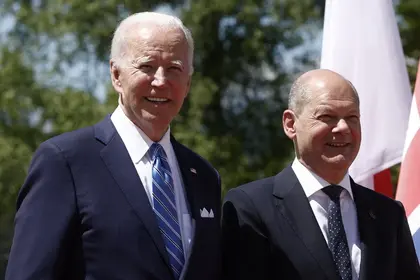German Chancellor Olaf Scholz is due at the White House on FridayMarch 3, for talks with President Joe Biden on charting the way ahead in their support for Ukraine, after friction over tank deliveries to Kyiv.
Scholz's first trip to Washington since February 2022 offers the leaders a chance to demonstrate their resolve in backing Ukraine against Russia.
JOIN US ON TELEGRAM
Follow our coverage of the war on the @Kyivpost_official.
But the talks will also likely delve into thorny issues dividing the two, including Germany's fears over Washington's green subsidies under the Inflation Reduction Act, and US caution over Berlin's continued strong economic ties with Beijing.
"I think the two of them are now more concerned about the way ahead -- what will the next months in Ukraine look like? What does that mean for the support that the allies can organize for Ukraine?" said Scholz's spokesman Steffen Hebestreit.
They will "certainly discuss one or two other topics," he said, declining to elaborate.
In an address to parliament on the eve of the meeting, Scholz said the partnership was "closer and more trusting than ever."
As the war in Ukraine enters its second year, Scholz offered a hint at the ongoing discussions among allies.
"We are speaking with Kyiv and other partners over future security guarantees for Ukraine," he told the Bundestag.
But Russia on Friday warned Western countries against providing more weapons to Ukraine, singling out Germany ahead of Scholz's meeting with Biden.

Zelensky Meets CIA Director William Burns in Ukraine
"It is obvious that this will prolong the conflict and have sad consequences for the Ukrainian people," Kremlin spokesman Dmitry Peskov said.
- 'Alliance unity' -
The chancellor's visit also comes after a period of tensions, namely over the delivery of modern battle tanks long sought by officials in Kyiv, which was agreed to at the end of January.
In an admission of the friction between the two of the biggest armaments suppliers to Ukraine, US national security advisor Jake Sullivan said that Germany had said no Leopard tanks would be sent "until the president also agreed to send Abrams."
Biden relented "in the interests of (NATO) alliance unity and to ensure that Ukraine got what it wanted," Sullivan said.
The German government has insisted that the two sides needed time to develop a "common approach" to weapons deliveries.
The saga showed that "the divisions between the US and Germany can be bridged, but that doing so is possible only at the highest levels in certain cases," said former US diplomat Jeffrey Rathke.
The meeting at the Oval Office is scheduled for 1900 GMT and the two leaders are expected to make short statements to the press.
- 'Especially sensitive' -
Since Biden's arrival in the Oval Office, the United States' relationship with Germany has seen its ups and downs.
The successor to Donald Trump put pressure on Berlin to drop the controversial Nord Stream 2 gas pipeline from Russia to Germany -- a move it finally made in the days just before Russia invaded Ukraine.
On Friday, the two leaders would likely also tackle issues surrounding relations with China. Germany's economic ties with the Asian superpower put it in a delicate position.
Tensions have flared between Beijing and Washington over Chinese balloons being shot down over the United States and economic competition in key technologies such as semiconductors.
The meeting would also be a chance to send a "clear and persuasive signal to China" over its relationship with Russia, Rathke said, with both sides warning Beijing against sending arms to Moscow.
Nonetheless, Berlin would be "especially sensitive to the potential fall-out of more overt Chinese aid to Russia's war effort," said Joern Fleck of the Atlantic Council.
At the same time, Scholz will also bring his concerns over what Berlin and the EU view as unfair green subsidies under the US "Inflation Reduction Act."
The debate over the program is "a test for the trans-Atlantic relationship," said the influential BDI German industrial lobby.
Scholz needed to push for "improvements" to the program to avoid EU companies being disadvantaged, and to ward off a trade war between the two, it added.
You can also highlight the text and press Ctrl + Enter






